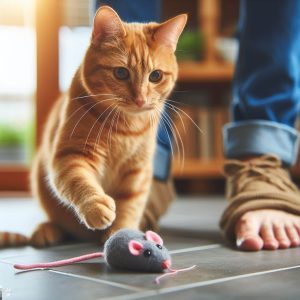Chicken broth is a staple in many human kitchens. Its warm, savory flavor makes it a soothing addition to soups, stews, grains, and more. But is this versatile broth safe for cats to eat too?
As cat owners, it’s our responsibility to understand what foods are healthy or harmful for our furry companions. Knowing exactly what goes into any people food we share is key.
So can cats have chicken broth? What are the benefits and risks? How much is safe to feed cats? This comprehensive guide has all the answers. Read on for tips from vets on safely incorporating chicken broth into your cat’s diet.
An Overview of Chicken Broth for Cats
Chicken broth that contains no onions, garlic, spices, or other toxic ingredients is generally considered safe for feline consumption. Most vets agree that small amounts of plain, unsalted chicken broth can be an OK supplemental treat.
Broth made from chicken can provide cats with hydration and nutrients from the meat. The smell and taste often stimulate appetite in picky or sick cats too.
However, the high sodium content means broth shouldn’t make up a large portion of your cat’s diet. Too much can cause kidney and heart problems. Stick to a few teaspoons at a time.
Always introduce new foods gradually while monitoring your cat’s reaction. Stop giving broth if any digestive upset occurs. Talk to your vet before feeding broth to cats with pre-existing conditions.
Tip: Look for low-sodium or no-salt-added chicken broth options to reduce the sodium content.
Nutritional Value of Chicken Broth for Felines
Chicken broth delivers a small dose of protein and essential vitamins/minerals like potassium, calcium, magnesium, and phosphorus.
The collagen from bone broth provides amino acids that support skin, coat, joint, and immune health. Broth also contains glucosamine and chondroitin for cartilage and arthritis relief.
However, plain broth is mostly water with little nutritional value on its own. It lacks the fat, carbohydrates, and complete proteins cats need from balanced commercial or raw food diets. Too much reliance on broth can lead to malnutrition.
Chicken broth offers trace amounts of vitamins and minerals:
- Vitamin A: Immune support, vision health
- Vitamin C: Collagen formation, wound healing
- Vitamin B: Nerve function, metabolism
- Potassium: Muscle/nerve health, blood pressure
- Calcium: Bone strength, nerve transmission
- Magnesium: Enzyme function, protein production
- Phosphorus: Bone formation, kidney function
Benefits of Chicken Broth for Cats
Here are some of the main benefits of sharing small amounts of chicken broth with cats:
1. Encourages Hydration
Broth contains lots of water derived from cooking chicken meat and bones. The rich flavor entices cats to drink more which is important for kidney function and urinary tract health.
Dehydration is common in cats, so broth can supplement their fluid intake. Try pouring it over dry food to increase palatability.
2. Supports Appetite
Broth’s savory aroma and taste often stimulates appetite, especially for sick, elderly, or finicky cats who turn up their nose at food or water.
The warm liquid and meaty flavor helps cats associate mealtime with something positive. This can encourage eating which aids recovery.
3. Eases Digestive Upsets
Vets sometimes recommend a temporary broth-based diet for cats with vomiting, diarrhea, or stomach irritation.
The easily digestible liquid provides calories and nutrients without upsetting the gut. Once symptoms improve, transition back to regular cat food.
4. Supports Immune Health
Chicken bone broth provides amino acids and antioxidants that may give the immune system a boost. This can help cats recovering from illness, infection, surgery, or antibiotic use.
Certain compounds are believed to have anti-inflammatory effects to calm the immune response as well. Always check with your vet first though.
5. Provides Joint Support
The collagen and glycosaminoglycans in bone broth deliver chondroitin and glucosamine – compounds shown to support joint health and mobility in aging cats. The gelatin may also lubricate joints.
Broth is great for cats with stiffness, arthritis, or mobility issues. It provides the building blocks for cartilage repair.
Risks of Chicken Broth for Felines
Chicken broth does carry some risks, especially if given incorrectly or excessively. Here are some key considerations:
High Sodium Content
Broth’s naturally high sodium content poses risks, as too much sodium can burden cats’ kidneys leading to dehydration and heart disease.
Limit broth portions and choose no-salt or low-sodium options. Consult your vet about appropriate sodium levels for cats with kidney/heart conditions.
Allergies and Intolerances
Some cats may have poultry allergies or be intolerant to ingredients derived from chicken. Signs include vomiting, diarrhea, itching, and skin irritation.
If your cat has food allergies or sensitivities, avoid chicken broth or try broth made with different meat sources.
Toxic Ingredients
Many commercial broths contain onions, garlic, herbs and other toxic add-ins. Carefully read labels and avoid seasoned products.
Stick to plain, unsalted chicken broth with no other ingredients beyond meat and bones. Check organic and veterinary brands for safest options.
Nutritional Imbalances
Depending on broth as a major food source could lead to nutritional deficiencies over time due to the lack of fat, carbs and complete proteins.
Broth is not a balanced meal. Ensure your cat’s main diet includes cat food with the full spectrum of nutrients needed.
Digestive Upset
Too much fatty broth may produce stomach upset like vomiting or diarrhea. Introduce new foods slowly and stop giving broth if you notice these symptoms.
For sick cats, stick to plain, fat-skimmed, water-based broths that are gentlest on the stomach. Consult your vet for guidance.
Pancreatitis Risk
The fat content also poses a risk of pancreatitis – a serious inflammation of the pancreas. Obese or overweight cats are especially prone to this condition.
Have your vet evaluate your cat’s health before sharing any fatty foods. Lower-fat chicken broth is less risky.
How Much Chicken Broth is Safe For Cats?
Moderation is key when it comes to broth for cats. Follow these tips:
- Limit broth to 1-3 teaspoons at a time
- Avoid daily feeding – make it an occasional treat 2-3 times per week at most
- Small cat breeds should have less broth due to smaller bodies
- Kittens can have a few drops diluted in water; increase portion sizes slowly as they mature
- Elderly or ill cats may need more limited portions
- Stop giving broth if any signs of digestive upset
- Talk to your vet to determine the appropriate amount based on your cat’s health status
It’s generally best to start slowly with a teaspoon or less to monitor your cat’s reaction. Increase portion size gradually while staying below 3 teaspoons per serving.
For sick or recovering cats needing temporary broth-based diets, follow your vet’s suggested feeding schedule.
How To Choose a Safe, Cat-Friendly Chicken Broth
Not all broths are created equal when it comes to feline nutrition. Here’s how to pick a healthy chicken broth for cats:
- Opt for low-sodium or no-salt-added to limit sodium intake
- Avoid seasoned broths with onions, garlic, herbs or spices
- Check the label carefully for any questionable ingredients
- Look for organic, free-range, grass-fed for higher quality
- Choose fat-skimmed or low-fat broth to decrease pancreatitis risks
- Pick gelatinous bone broths for more collagen, glucosamine, chondroitin
- Consider veterinary brands formulated for pets
- Make your own using just chicken meat, bones, and water
Homemade bone broth has the benefit of controlling exactly what goes into it. Simmer raw chicken bones for 8-24 hours to extract the nutrients.
For a store-bought option, organic low-sodium chicken broth tends to be the safest choice. Talk to your veterinarian for any broth recommendations too.
How To Feed Chicken Broth to Cats
Ready to share some broth with your feline companion? Here are some serving suggestions:
- Pour a few teaspoons over dry kibble to increase palatability
- Mix into canned food to thin the texture or enhance flavor
- Add small amounts to their drinking water to promote hydration
- Use as a base for homemade blends and purees for sick cats
- Freeze broth in ice cube trays for easy portioning
- Place small saucers of warmed broth near food to stimulate appetite
- Let broth cool completely before serving to avoid burns
- Introduce slowly and monitor for reactions with each new serving
For picky eaters or sick cats, try these tips:
- Warm the broth slightly to release the aroma
- Use a broth-moistened finger to entice licking
- Dip paws in broth to encourage grooming and consumption
- Draw attention with stirring motions and broth sound effects
- Offer aromatic broth first, then follow with food
- Don’t leave broth out for more than 2 hours to prevent spoilage
Getting creative with broth serving methods can make it more appealing. But remember – moderation is key, and stop giving broth if any concerns arise.
Can Kittens Have Chicken Broth?
Chicken broth can be fed to kittens in small amounts, but their smaller bodies require some special precautions.
The high sodium levels make broth risky for kittens under 12 weeks. Stick to just a few drops diluted in water initially.
Gradually increase portion sizes while monitoring stool quality and hydration. Excess sodium causes diarrhea in young kittens.
For malnourished or ill kittens, vets may recommend short-term broth-based diets. Always get guidance tailored to the individual kitten’s health status.
In general, broth is safest after 12 weeks when kittens transition to solid foods. Use it to enhance hydration or entice eating as needed.
Can Chicken Broth Help Elderly or Ill Cats?
Chicken broth can benefit geriatric or sick cats in specific ways, but also requires caution:
Benefits
- Provides hydration to counter kidney problems
- Stimulates appetite for cats with low food intake
- Eases digestion for cats with nausea or diarrhea
- Supports joint health for cats with arthritis
- Aids recovery with electrolytes and nutrients
Risks
- High sodium exacerbates some conditions
- Fat exacerbates gastrointestinal issues
- Allergies or intolerances cause adverse reactions
- Can disrupt special veterinary diets
- Risk of aspiration in cats with swallowing issues
Always get veterinary approval before sharing broth with ill or elderly cats. Follow your vet’s dosage and feeding guidelines. Monitor closely and report any concerns.
With proper precautions, broth can be helpful – but the cat’s overall health determines what’s appropriate. Better to err on the side of caution.
Top Tips for Feeding Chicken Broth to Cats
To sum up, here are some top tips when it comes to sharing chicken broth with felines:
- Choose plain, unseasoned broth with no onions, garlic or salt
- Limit portions to 1-3 teaspoons max per meal
- Make it an occasional treat, not a daily staple
- Introduce slowly and watch for any negative reactions
- Reduce sodium by using low-sodium or homemade options
- Prevent pancreatitis by selecting lower-fat broth
- Focus on hydration and nutrition for sick, elderly or recovering cats
- Always get veterinary approval for ill, senior, or special needs cats
- Stop giving broth if you notice any vomiting, diarrhea, or allergic response
While chicken broth can provide benefits, proper precautions are key. Work closely with your vet and listen to your cat’s health signals.
The Takeaway: Chicken Broth as an Occasional Feline Treat
In small, infrequent amounts, plain chicken broth can provide cats with added hydration, nutrients, and appetite stimulation. Just be sure to steer clear of sodium, fat, and any questionable ingredients.
Introduce new foods gradually while following your veterinarian’s recommended guidelines based on your cat’s health. Avoid over-reliance on broth instead of balanced cat food.
Pay close attention to your cat’s reaction with every new broth serving. Stop immediately if any concerning symptoms develop.
With judicious use and proper precautions, chicken broth can be a healthy supplemental treat for cats. But the focus should remain on a complete and balanced main diet. Broth is just a small splash in your feline friend’s nutritional bowl.



